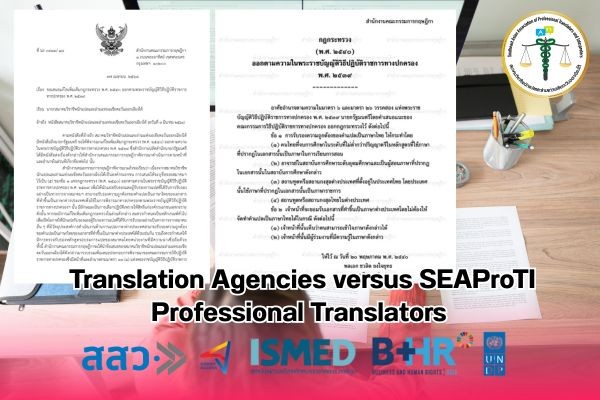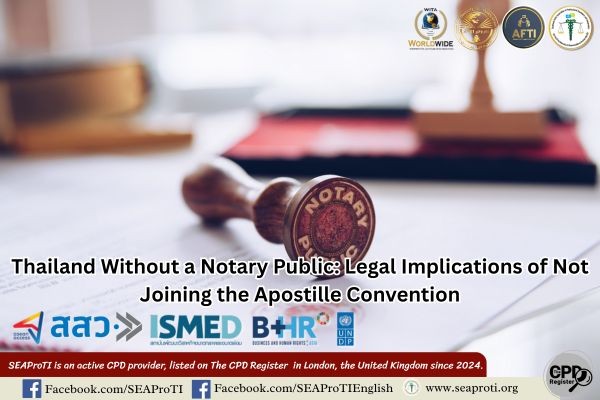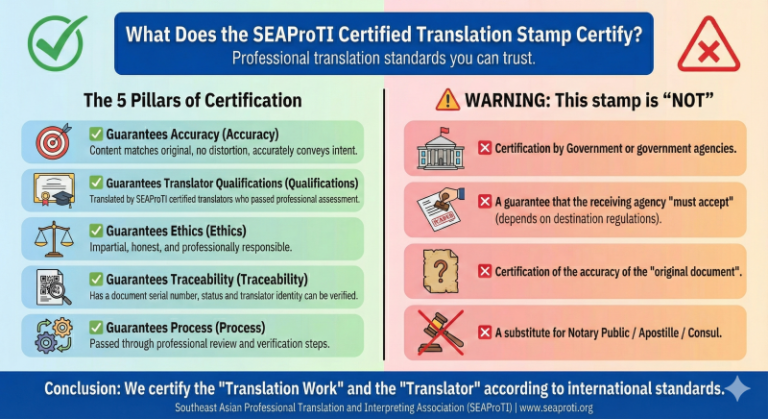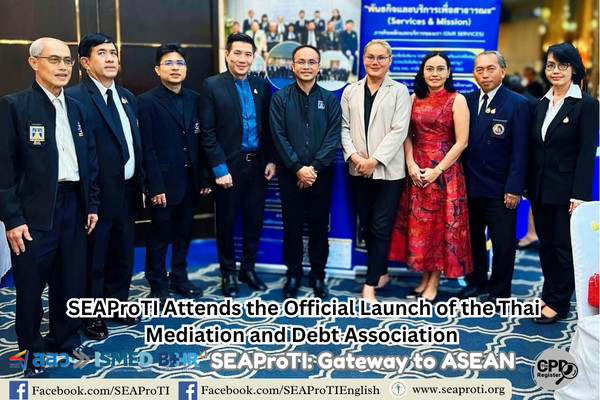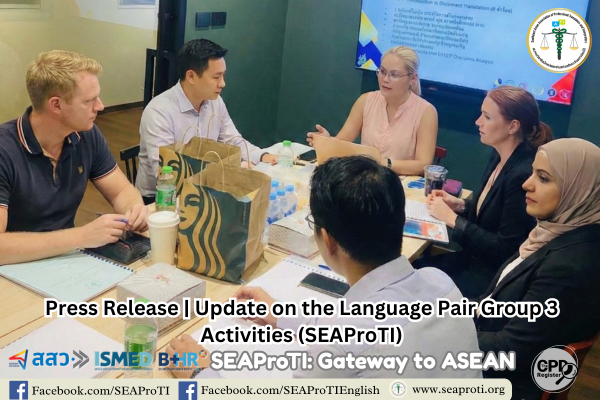A Comparative Study of Translation Services: Translation Agencies versus SEAProTI Professional Translators
August 19, 2025, Bangkok – Document translation plays a crucial role in today’s globalized world, particularly in law, business, and international communication. Accuracy and credibility of translation are factors that directly affect the outcome of documents. Generally, clients may choose between translation agencies and certified translators recognized by professional associations, such as the Southeast Asian Association of Professional Translators and Interpreters (SEAProTI). However, each option has its own advantages and limitations. This study aims to analyze and compare the distinctive characteristics of both approaches.
Translation Agencies: Convenience and Comprehensive Services
Translation agencies are structured to emphasize speed and a wide range of services, from multilingual translation and document formatting to coordinating official certification with government agencies. Their key strength lies in teamwork, which allows them to handle large volumes of work and urgent projects (Chan, 2020).
Nevertheless, some agencies may employ translators with insufficient qualifications, resulting in inconsistent quality. Moreover, the fact that documents often pass through several hands increases the risk of data breaches, particularly for documents containing personal information or trade secrets (Byrne, 2012).
SEAProTI Professional Translators: Expertise and Ethical Standards
Translators certified by SEAProTI are required to meet rigorous linguistic and professional standards, as well as adhere to a strict code of ethics. This enhances the credibility and reliability of their translations (SEAProTI, 2025). Such translators often specialize in fields like law, medicine, and international business, ensuring the appropriate use of terminology and context-specific expressions.
However, certified translators usually work individually. As a result, handling large volumes of documents or urgent requests may take more time. Furthermore, services such as official certification through embassies, consulates, or legal professionals may not be directly included (Pym, 2011).
Legal Framework and Certification of Translations
According to the Ministerial Regulation (1997) issued under the Administrative Procedure Act (1996) on “Certification of the Accuracy of Thai Translations,” the following individuals and entities are authorized to certify translations:
(1) Thai nationals holding at least a bachelor’s degree in a program taught in the language appearing in the document.
(2) University lecturers teaching the relevant language at the tertiary level.
(3) Foreign embassies or consulates located in Thailand, where the language in the document is an official language of that country.
(4) Thai embassies or consulates abroad.
(5) Although the Ministerial Regulation has not yet been formally enacted, the Office of the Council of State has recommended issuing a Royal Decree to authorize registered translators, including certified members of professional associations or language institutions, to provide translation certification. This aims to create a unified, transparent, and legally recognized framework (Letter to SEAProTI, April 2025; see attached file).
Thus, while documents may be translated by either a translation agency or a SEAProTI professional translator, their official certification for government purposes must be carried out by individuals or entities specified by law (Office of the Council of State, 2023).
Comparative Advantages and Disadvantages
| Aspect | Translation Agencies | SEAProTI Professional Translators |
|---|---|---|
| Convenience/Speed | Handle urgent, high-volume tasks | May require more time in some cases |
| Translation Quality | Inconsistent, depends on translator | Standardized, specialized expertise |
| Document Certification | Some provide coordination services | Requires external certification |
| Credibility | Dependent on agency reputation | Supported by professional standards |
| Confidentiality | Higher risk if handled by multiple parties | Strict professional ethics |
Conclusion
Both translation agencies and SEAProTI professional translators have their advantages and limitations. Translation agencies are suitable for those seeking convenience, speed, and comprehensive services. In contrast, SEAProTI-certified translators are ideal for clients prioritizing quality, subject-matter expertise, and professional ethical standards.
The decision depends on the type of document, purpose of use, and the legal requirements for accuracy, especially in cases involving government agencies or international business transactions.
References
- Byrne, J. (2012). Scientific and technical translation explained: A nutshell for beginners. Routledge.
- Chan, S. W. (2020). Translation and communication in the global era. Springer.
- Pym, A. (2011). Translation research terms: A tentative glossary for moments of perplexity and dispute. Intercultural Studies Group.
- SEAProTI. (2025). Standards and certification of professional translators and interpreters in Southeast Asia. Bangkok: SEAProTI Publications.
- Office of the Council of State. (2023). Guidelines on interpreting the Ministerial Regulation on certification of the accuracy of translations, B.E. 2540 (1997). Bangkok: Office of the Council of State.
* About Certified Translators, Translation Certification Providers, and Certified Interpreters of SEAProTI
The Southeast Asian Association of Professional Translators and Interpreters (SEAProTI) has established criteria and qualifications for registering as Certified Translators, Translation Certification Providers, and Certified Interpreters. These standards were published in the Royal Gazette by the Secretariat of the Cabinet, Office of the Prime Minister of the Kingdom of Thailand, on July 25, 2024, Vol. 141, Part 66 Ng, p. 100. Full text available at: Certified Translators, Translation Certification Providers, and Certified Interpreters.
** The Office of the Council of State has proposed that a Royal Decree be enacted, stipulating that registered translators, as well as translation certifiers from professional associations or language institutes that provide training and maintain a registration system, shall be authorized to certify translations. (Letter to SEAProTI dated 28 April 2025)
*** SEAProTI is the first professional association in Thailand and Southeast Asia to implement a certification system for translators, interpreters, and translation certification providers.
Head Office: Baan Ratchakru Building, No. 33, Room 402, Soi Phaholyothin 5, Phaholyothin Road, Phaya Thai Subdistrict, Phaya Thai District, Bangkok 10400 Email: hello@seaproti.com Telephone: (+66) 2-114-3128 (Business Hours: Monday–Friday, 9:00 AM–5:00 PM)
การเปรียบเทียบบริการแปลเอกสาร: ศูนย์รับแปลเอกสารกับนักแปลวิชาชีพ SEAProTI
19 สิงหาคม 2568, กรุงเทพมหานคร – การแปลเอกสารเป็นกระบวนการที่มีความสำคัญอย่างยิ่งในยุคโลกาภิวัตน์ ทั้งในเชิงกฎหมาย ธุรกิจ และการสื่อสารระหว่างประเทศ ความถูกต้องและความน่าเชื่อถือของการแปลเป็นปัจจัยที่ส่งผลโดยตรงต่อผลลัพธ์ของเอกสาร โดยทั่วไป ผู้ใช้บริการมักเลือกใช้ ศูนย์รับแปลเอกสาร หรือ นักแปลที่ได้รับการรับรองจากสมาคมวิชาชีพ เช่น สมาคมวิชาชีพนักแปลและล่ามแห่งเอเชียตะวันออกเฉียงใต้ (SEAProTI) อย่างไรก็ตาม แต่ละทางเลือกย่อมมีข้อดีและข้อจำกัดที่แตกต่างกัน การศึกษานี้มีวัตถุประสงค์เพื่อวิเคราะห์และเปรียบเทียบลักษณะเด่นของทั้งสองแนวทาง
ศูนย์รับแปลเอกสาร: ความสะดวกและการจัดการแบบครบวงจร
ศูนย์รับแปลเอกสาร (translation agency) มีลักษณะการดำเนินงานที่เน้นความรวดเร็วและครอบคลุมบริการหลากหลาย ตั้งแต่การแปลเอกสารหลายภาษา การจัดรูปแบบ ไปจนถึงการประสานงานเพื่อการรับรองเอกสารกับหน่วยงานรัฐ จุดแข็งสำคัญคือการทำงานเป็นทีม ซึ่งทำให้สามารถรองรับงานที่มีปริมาณมากและต้องการความเร่งด่วนได้ (Chan, 2020)
อย่างไรก็ตาม ศูนย์แปลบางแห่งอาจใช้ผู้แปลที่มีคุณวุฒิไม่เพียงพอ ส่งผลต่อความสม่ำเสมอของคุณภาพ นอกจากนี้ การที่ข้อมูลเอกสารต้องผ่านหลายฝ่ายอาจก่อให้เกิดความเสี่ยงต่อการรั่วไหลของข้อมูล โดยเฉพาะเอกสารที่มีข้อมูลส่วนบุคคลหรือความลับทางธุรกิจ (Byrne, 2012)
นักแปลวิชาชีพ SEAProTI: ความเชี่ยวชาญและมาตรฐานจรรยาบรรณ
นักแปลที่ได้รับการรับรองจาก SEAProTI ต้องผ่านเกณฑ์มาตรฐานด้านภาษาและวิชาชีพที่เข้มงวด รวมถึงการยึดถือจรรยาบรรณในการทำงาน ซึ่งช่วยเพิ่มความน่าเชื่อถือและความมั่นใจในคุณภาพของงานแปล (SEAProTI, 2025) นักแปลเหล่านี้มักมีความชำนาญเฉพาะทาง เช่น กฎหมาย การแพทย์ และธุรกิจระหว่างประเทศ จึงสามารถใช้คำศัพท์และสำนวนได้ถูกต้องตามบริบท
ข้อจำกัดคือ นักแปลวิชาชีพมักทำงานในลักษณะรายบุคคล ทำให้การรับงานปริมาณมากหรือเอกสารเร่งด่วนอาจต้องใช้เวลาเพิ่มขึ้น อีกทั้งการประสานงานเรื่องการรับรองเอกสาร เช่น การนำส่งไปยังสถานทูต กงสุล หรือทนายความ อาจไม่ได้รวมอยู่ในบริการโดยตรง (Pym, 2011)
กรอบกฎหมายและการรับรองคำแปล
ตามกฎกระทรวงที่ออกตามพระราชบัญญัติวิธีปฏิบัติราชการทางปกครอง พ.ศ. 2539 เรื่อง “การรับรองความถูกต้องของคำแปลเป็นภาษาไทย” (ประกาศในราชกิจจานุเบกษาเมื่อปี พ.ศ. 2540) กำหนดให้ผู้ที่สามารถ “รับรองความถูกต้องของคำแปลเป็นภาษาไทย” ได้ มีดังนี้
(1) คนไทยที่จบการศึกษา “ไม่ต่ำกว่าปริญญาตรี” ในหลักสูตรที่ “ใช้ภาษาที่ปรากฏในเอกสารนั้น” เป็นภาษาในการเรียนการสอน (บุคคลที่จบการศึกษาไม่ต่ำกว่าปริญญาตรีในภาษาที่เกี่ยวข้อง)
(2) อาจารย์ในสถาบันการศึกษาระดับอุดมศึกษา และเป็น “ผู้สอนภาษา” ที่ปรากฏในเอกสารนั้นในสถาบันการศึกษาดังกล่าว (อาจารย์ในสถาบันอุดมศึกษาที่สอนภาษานั้น)
(3) สถานทูตหรือสถานกงสุล “ต่างประเทศ” ที่ตั้งอยู่ในประเทศไทย โดยประเทศนั้นใช้ภาษาที่ปรากฏในเอกสารนั้นเป็นภาษาราชการ (สถานทูตหรือสถานกงสุลของประเทศที่ใช้ภาษาดังกล่าว)
(4) สถานทูตหรือสถานกงสุลไทยในต่างประเทศ
(5) แม้กฎกระทรวงว่าด้วยการรับรองความถูกต้องของคำแปลยังไม่ประกาศใช้ แต่สำนักคณะกรรมการกฤษฎีกาเสนอให้ตราเป็นพระราชกฤษฎีกา โดยกำหนดให้นักแปลที่ขึ้นทะเบียน รวมถึงผู้รับรองการแปลจากสมาคมวิชาชีพหรือสถาบันสอนภาษาที่มีการอบรมและขึ้นทะเบียน สามารถรับรองคำแปลได้ เพื่อสร้างมาตรฐานเดียวกัน โปร่งใส ตรวจสอบได้ และยกระดับวิชาชีพการแปลให้มีฐานะทางกฎหมาย (จดหมายถึงสมาคม SEAProTI, เม.ย. 2568 โปรดดูไฟล์แนบ)
ดังนั้น แม้เอกสารจะถูกแปลโดยศูนย์รับแปลเอกสารหรือโดยนักแปลวิชาชีพ SEAProTI แต่การรับรองเอกสารเพื่อนำไปใช้ในทางราชการยังต้องอาศัยบุคคลหรือหน่วยงานที่กฎหมายกำหนด (สำนักงานคณะกรรมการกฤษฎีกา, 2023)
การเปรียบเทียบข้อดีและข้อเสีย
| ประเด็น | ศูนย์รับแปลเอกสาร | นักแปลวิชาชีพ SEAProTI |
|---|---|---|
| ความสะดวก/รวดเร็ว | รองรับงานด่วน ปริมาณมาก | ใช้เวลามากกว่าในบางกรณี |
| คุณภาพงานแปล | ไม่สม่ำเสมอ ขึ้นกับผู้แปล | มีมาตรฐานชัดเจน เชี่ยวชาญเฉพาะทาง |
| การรับรองเอกสาร | บางแห่งช่วยประสานงานได้ | ต้องดำเนินการส่งต่อเอง |
| ความน่าเชื่อถือ | ขึ้นอยู่กับชื่อเสียงศูนย์ | ได้มาตรฐานสมาคมวิชาชีพ |
| การรักษาความลับ | เสี่ยงหากข้อมูลผ่านหลายฝ่าย | มีข้อบังคับด้านจรรยาบรรณชัดเจน |
บทสรุป
ทั้งศูนย์รับแปลเอกสารและนักแปลวิชาชีพ SEAProTI ต่างมีข้อดีและข้อจำกัด ศูนย์รับแปลเหมาะสำหรับผู้ที่ต้องการความสะดวก รวดเร็ว และบริการแบบครบวงจร ขณะที่นักแปลวิชาชีพ SEAProTI เหมาะสำหรับผู้ที่ให้ความสำคัญกับคุณภาพ ความเชี่ยวชาญ และมาตรฐานจรรยาบรรณ
การตัดสินใจเลือกขึ้นอยู่กับ ประเภทของเอกสาร วัตถุประสงค์การใช้งาน และความสำคัญของความถูกต้องทางกฎหมาย โดยเฉพาะในกรณีที่ต้องนำเอกสารไปใช้กับหน่วยงานราชการหรือธุรกิจระหว่างประเทศ
เอกสารอ้างอิง
- Byrne, J. (2012). Scientific and technical translation explained: A nutshell for beginners. Routledge.
- Chan, S. W. (2020). Translation and communication in the global era. Springer.
- Pym, A. (2011). Translation research terms: A tentative glossary for moments of perplexity and dispute. Intercultural Studies Group.
- SEAProTI. (2025). Standards and certification of professional translators and interpreters in Southeast Asia. Bangkok: SEAProTI Publications.
- สำนักงานคณะกรรมการกฤษฎีกา. (2566). คำแนะนำการตีความกฎกระทรวงว่าด้วยการรับรองความถูกต้องของคำแปล พ.ศ. 2540. กรุงเทพฯ: สำนักงานคณะกรรมการกฤษฎีกา
เกี่ยวกับนักแปลรับรอง ผู้รับรองการแปล และล่ามรับรองของสมาคมวิชาชีพนักแปลและล่ามแห่งเอเชียตะวันออกเฉียงใต้
* สมาคมวิชาชีพนักแปลและล่ามแห่งเอเชียตะวันออกเฉียงใต้ (SEAProTI) ได้ประกาศหลักเกณฑ์และคุณสมบัติผู้ที่ขึ้นทะเบียนเป็น “นักแปลรับรอง (Certified Translators) และผู้รับรองการแปล (Translation Certification Providers) และล่ามรับรอง (Certified Interpreters)” ของสมาคม หมวดที่ 9 และหมวดที่ 10 ในราชกิจจานุเบกษา ของสำนักเลขาธิการคณะรัฐมนตรี ในสำนักนายกรัฐมนตรี แห่งราชอาณาจักรไทย ลงวันที่ 25 ก.ค. 2567 เล่มที่ 141 ตอนที่ 66 ง หน้า 100 อ่านฉบับเต็มได้ที่: นักแปลรับรอง ผู้รับรองการแปล และล่ามรับรอง
** สำนักคณะกรรมการกฤษฎีกาเสนอให้ตราเป็นพระราชกฤษฎีกา โดยกำหนดให้นักแปลที่ขึ้นทะเบียน รวมถึงผู้รับรองการแปลจากสมาคมวิชาชีพหรือสถาบันสอนภาษาที่มีการอบรมและขึ้นทะเบียน สามารถรับรองคำแปลได้ (จดหมายถึงสมาคม SEAProTI ลงวันที่ 28 เม.ย. 2568)
*** สมาคมวิชาชีพนักแปลและล่ามแห่งเอเชียตะวันออกเฉียงใต้ เป็นสมาคมวิชาชีพแห่งแรกในประเทศไทยและภูมิภาคเอเชียตะวันออกเฉียงใต้ที่มีระบบรับรองนักแปลรับรอง ผู้รับรองการแปล และล่ามรับรอง
สำนักงานใหญ่: อาคารบ้านราชครู เลขที่ 33 ห้อง 402 ซอยพหลโยธิน 5 ถนนพหลโยธิน แขวงพญาไท เขตพญาไท กรุงเทพมหานคร 10400 อีเมล: hello@seaproti.com โทรศัพท์: (+66) 2-114-3128 (เวลาทำการ: วันจันทร์–วันศุกร์ เวลา 9.00–17.00 น.)


